|
|
 The
VigilanceVoice The
VigilanceVoice

VigilanceVoice.com
v
v
Thursday-- February 21, 2002—Ground
Zero Plus 163

Children Who Grow Life From
Death
by
Cliff McKenzie
Editor, New York City Combat Correspondent News

GROUND ZERO, New York City, Feb. 21--Children are famous
for seeing and believing things adults cannot. Yesterday,
my grandchildren taught me life comes from death. They
planted the memory of my buddy Guy, whom I helped bury yesterday,
and grew him into beautiful flowers in their magical garden.
Let me share with
you the story of how they grew life from death.
It was a long day
for me. The night before I had been my "soul
buddy's" wake, and the next day was his funeral.
My wife went to the
services with me but had to leave right afterwards to take care
of our grandchildren. The services were quiet, reserved,
dignified--a reflection of how Guy lived his life.
I wanted to go to the cemetery
but didn't want to impose on the family for a ride, so I hitchhiked
with the driver of the flower car--a sleek black '78 Cadillac
Seville with a long bed in the back, made specifically for carrying
mounds of flowers.
 |
I have a penchant for cemeteries and funerals.
It's in my genes. I come from a long line of morticians,
undertakers, funeral directors. My great great grandfather
established the first mortuary in Oregon--The Anderson Funeral Home.
It is a state historical landmark today.
My mother and father were divorced when I was
nine months old, and my step-father adopted me, changing my name to his.
But my blood lines are embalmed on the funeral side. When I
see a graveyard, I have this compulsion to stop and walk through it,
reading tombstones, conferring with the spirits who lie in rest.
On vacations my children would groan whenever I
spotted a graveyard. "No, Dad. No!" they would chant, knowing I was going
to pull in and they would begrudgingly walk with me as I read the
interesting inscriptions on the tombstones. I liked paying my
respects to the legacy of life; they didn't.
Clem, the driver of the flower car, was impressed
I was "one of them,"--a guy with a funeral background. He told me he
would be leaving right after he delivered the flowers and apologized that
I would be on my own getting back. I told him not to worry, I
would find a way.
Clem is 74-years-young. I probed him with
questions, a result of my instincts as a reporter and writer.
I wanted to know about his life, his experiences in dealing with "death."
He told me how he drove thousands of grieving families to the various
cemeteries around New York City. He told me his mission was to help
relieve their pain and suffering. His greatest joy, he said,
was to say things that made people laugh, to assuage the tears, to release
the pressure caused by the gut wrenching loss of a loved one.
"One woman told me as she got out of the
limo--'Clem, I'm not sure if I've been to a party or buried my
husband--thank you.' That's what I like. I like making people
feel good in bad times. If I achieve that, I've had a good day."
He said it with the pride of an Olympic Gold Medalist.
We talked about grandchildren most of the way.
Clem roller blades with his, who range from three years old up to twenty
one. We swapped stories about the joy of sharing life with our
grandchildren, and how regretful it was many grandparents didn't spend
time with their grandchildren to learn about the joy of life through the
kids' eyes. I told him my wife and I had moved to New York
City to be near our grandchildren. We wanted to help them grow up,
to pass on the legacy of life to them. Little did I know the legacy
of life would be passed from them to me.
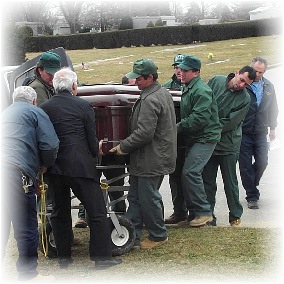 |
We arrived at the burial site before the family
caravan. I watched the workmen unload the casket. Clem
wrestled it as though he were nineteen.
I stood by the eight-foot hole in the ground where Guy would be
interned and took pictures of it for photo memorial I planned. I
like to capture an important event in my life with photos, and then write
about it--bringing in both the visual and visceral to play off one
another.
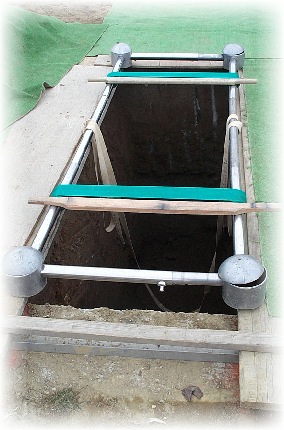 |
The cemetery, Valhalla in Westchester County,
is the resting place of Babe Ruth and Mickey Mantle, and other great
baseball players and athletes, Clem said. Guy was a baseball
fan.
I felt slightly concerned about clicking pictures
of the family grieving, and chose not to do that during the services.
I knew Guy would want me to take pictures for the memorial--he was one of
my biggest fans as a writer and photographer.
For his memorial, I took a flower and clutched a
handful of dirt from his gravesite and shoved it in my pocket.
Ashes to ashes, dust to dust, I thought. I didn't know what I
was going to do with the dirt, but I knew it would be my memento.
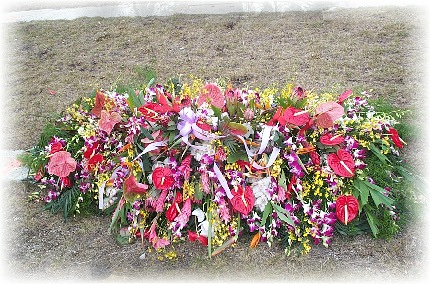 |
When
the ceremony ended the funeral director knew I was stranded. He
suggested I ask around to see if I could catch a ride back to Manhattan.
I told him I would find my way, and catch a train. I didn't
want to impose on anyone. Plus, the huge, rolling cemetery was like
a heartbeat to me--the home of those who had passed, a place where a guy
like me could walk and connect to the spirits of the deceased in a way I
found difficult to achieve with the living. There were too many
barriers with most people to break through. The dead listened
intently. The living only listened so they could talk.
I knew I had the ability to speak in the
language of the spirits of the soil--something in my genes perhaps, but a
feeling I had always known. And I had learned to listen.
I could sometimes hear the grass growing when I sat in the quiet with my
back against a tombstone. If there was unification between
life and death, if the soul was truly alive no matter what the state of
the physical body, I knew it would be most prominent in a graveyard.
I listened to believe in life after death. I also wanted Guy to know
I could hear him.
The journey to catch the train involved walking three
miles, some through the cemetery, then out of it into the town of Mount
Pleasant, and up to city of Hawthorne. As I walked I stuck my
hand in my pocket and felt the soil for Guy's grave. I reflected
heavily on his memory. I had part of him in my pocket.
| |
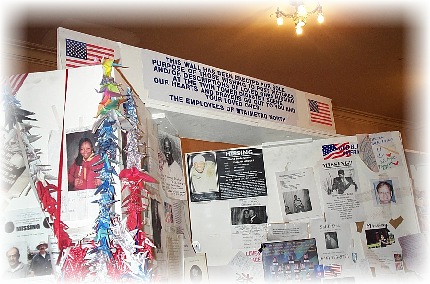
|
When I returned to the city I ended up in Grand Central
Station. Walking from the train to the subway, I spotted a
display from Nine Eleven. It was an MTA display of posters of people
missing from the World Trade Center, a a memorial of day of tragedy when the souls of the lost were put on
exhibit throughout the city by loved ones hoping they might be found,
praying they would return.
I took some pictures, and thought it ironic that
the day was filled messages from the Sentinels of Vigilance, from Guy's
funeral in Valhalla to hundreds of faces on posters in Grand Central
Station. The souls of the past, I thought, were reminding the living
to not waste a single moment in fear, intimidation or complacency.
Vigilance, I thought, yes, the Sentinels of Vigilance were blaring their
trumpets at me.
* * *
On Wednesdays my wife baby-sits the
grandchildren. She called on my cell and asked if I could stop by
and fix a broken cabinet door. Our five-year-old grandson, Matt, had
tried to sit on it, she said.
I fixed the cabinet as the grandkids put on their pre-roller
skates, helmets and padding for a jaunt in the parking lot with grandma.
"Will you play with us, G-Pa?" my three-year-old
granddaughter, Sarah, asked. "Sure, I said. But I have a
present for you and your brother, Matt."
"What's that, G-Pa?" asked Matt, sliding over the
kitchen floor on his roller skates.
"You remember I went to a funeral today?"
Matt's got a quick mind. "Your friend, Guy, G-Pa?
Mommy and G-Ma went with you last night, right? To see Guy.
Why did you go again? Did someone else die?"
He said it so innocently I smiled. "No, last
night was a wake for Guy. Kind of like a party where everyone comes
and says goodbye. Today was the funeral, Matt. Where he was
buried in the ground in a casket."
"Oh," said Sophia, moving close to be part of whatever
gift I had brought. "Guy was your friend, G-Pa!" She said it
without a question. I nodded.
"I brought you something from the funeral." I
reached into my coat pocket and pulled out some of the dirt I had taken
from Guy's gravesite. "This is dirt from Guy's grave," I
said. "It's for you. To remember him."
My grandson picked up a small clump and squeezed it
between his fingers. I could see his mind whirring. I waited
for any questions, ready to answer the big ones about death and dying.
Instead, a big smile grew upon on his face. He turned to me, eyes
wide.
"I got it, G-Pa. We'll take his dirt and plant it
in the garden in the back so it will grow. That way he'll be
alive again."
"Yes, G-Pa," chimed Sarah. "I want to plant his
dirt too. I want it to grow into a flower."
I sat in a semi-stun. I hadn't expected what they
said, but who can expect anything from a child's mouth. They
live in world adulthood destroys--in innocence not fretted by life's
pressures--in the freedom of fairy tales and security of the soul.
There was no "Oh, I'm sorry at your loss," comments. No, "I'm sad
for you, G-Pa." In their place were smiles, bright shiny eyes,
excitement.
"Okay," I answered. "Let's plant Guy."
I elected to go along with the children rather than
impose my own thoughts on them. They saw death as an
opportunity to live life. I wanted to learn from them. I
was their student now.
The previous day our daughter, the kids' mother, had
been telling us a story about the difference in viewpoints between
children and adults. She and the kids had been watching the
History of Dinosaurs, a production done by A&E with animation about
the various prehistoric beasts that were wiped off the face of the earth
64 million years ago. The theme of the show centered on the "balance
of nature," promoting how things come and go and adapt and evolve.
And how some don't--like the dinosaurs.
In one of the scenes a mother dinosaur went to
forage for food and left her nest where the one egg she laid was
hibernating became vulnerable to other creatures of the land.. An
army of hungry ants came by and, working together, broke the egg and ate
its contents. My daughter reported that as the scene unfolded she
said, "Oh, the poor Mommy. How sad for her."
Without a blink she said Matt looked up at her
and retorted--"But how good for the ants."
My daughter had seen the sadness of death--the
loss of an egg. Matt had seen the joy of life--the ants had
something to eat. To him, the dinosaur egg had become the ants
McDonald's Happy Meal. Nature giveth, Nature taketh.
So when the idea came out of Matt's mouth to plant
"Guy's dirt" in the garden so it could grow, I just said nothing but:
"Okay, let's do it." I didn't want to be a dinosaur.
The kids took their respective handfuls of dirt and
scooted out into the backyard on their roller skates. The
apartment building my daughter and her husband live in has a beautiful
garden in the back. The kids found a nice plot of earth and dug a
hole.
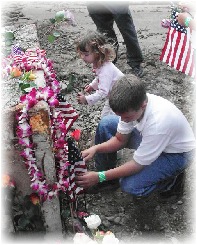 |
They placed Guy's gravesite soil in it. Carefully, they
covered up his soil and patted it gently. Then they called to
G-Ma for gardening assistance.
"We have to water Guy's dirt so it will grow," Matt
said. "Yes, G-Ma, can we have some water please," Sarah added.
"I want some too."
I snapped pictures madly. I was living a lesson in
life, taught by a three- and five-year-old. The kids were so excited
I became part of their innocence, absorbing their thirst for resurrecting
life.
The garden behind their apartment is
beautiful in the summer, full of richly colored flowers and adorned with
lightening bugs that dance in warm summer's nights to the sounds of the
city's cacophony. Hundreds of different bugs make their home in the
garden, providing an endless sense of Nature's formula that everything has
a purpose--that there is no end to the cycle of life, but rather a
regeneration from one form to another.
Even the brick walls come to life in the
children's garden. A street artist, who excels at painting murals on
the sides of buildings in East Village, created a "grotto of life"
on the wall of the building. It is symbolic of life, splashed
with verdant colors and birds and kids and people and flowers enjoying
nature and themselves--everything connected, from the bugs to the leaves
to the people.
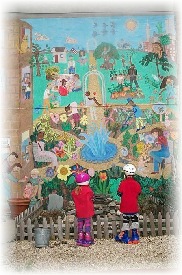 |
G-Ma
brought the water in plastic cups. The kids eagerly sprinkled
it on the earth that contained the "Seeds of Guy's memory."
They laughed and helped each other
saturate the soil just right, insisting on more water to insure
proper fertilization of the "Seeds of Guy."
"Mine will grow into a giant flower,"
Sarah said. "It will be a pretty flower. The
prettiest in the garden."
"Mine will be even a stronger
flower," Matt said in as masculine a Voice as a five-year-old
can conjure. "Mine will be the toughest flower.
No bugs will eat it because they'll be scared of it. My 'Guy
flower' will fight off all the bugs."
Clicking picture after picture, I felt
the presence of Guy in the garden with us. He was
laughing, eyes aglow. He was going to grow some
more.
The children had brought him back to
life, for to them, he had never died. He was just recycling.


Go
To Feb. 20--The Wake Of Life And Death
©2001
- 2004, VigilanceVoice.com, All rights reserved - a ((HYYPE))
design

|
|











